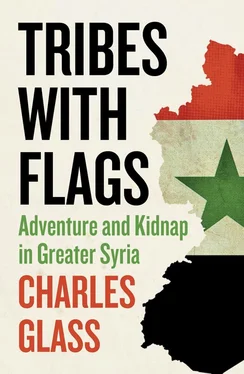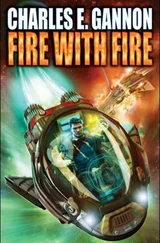Three dogs pulled and tore the flesh from the corpse. The lamb’s rib-cage was already bare, and still they clawed at the body and snatched lumps of meat with their jaws. They had opened the animal up from its soft stomach, and the wool was stretched aside to expose the food within. The entrails were mostly eaten, but the lamb’s head was untouched. Its eyes were open and blank. The dogs’ paws, their jowls and the hair around their eyes were stained, like the ground, dark red. One dog growled for a moment to warn another not to tread on its portion of the dead prey. Then it silently rejoined the feast, the grim work of devouring what each could of the lamb before they abandoned its carcass to the flies.
The black and white mongrels and the lamb were the only signs of life or death in the barren limestone hills. We were on the highway to Alexandretta, and the driver had stopped the bus and gone into a solitary hut just off the road. No one asked why. This was not, I would learn, unusual. Buses did not keep schedules here, and drivers made their money from more than the transport of passengers. They delivered food and parcels, they carried letters, they smuggled gold, cigarettes, coffee, refugees, drugs and weapons across borders. “A bus like this,” one man explained, “can support a whole family.”
Several passengers including myself had used the unscheduled stop to get out and stretch our legs. The sun was going down. I walked several yards from the bus to be alone. I was watching the dogs when another passenger approached me. “Do you have a degree?” he asked me in English. His accent was slight. He seemed to be in his mid-forties. He wore a grey zip jacket, khaki irousers and old, unpolished shoes. On his lip was a thin moustache.
“I’m sorry … ?” I said.
“A degree in something, from a university?”
“Yes, in philosophy.”
“Falsafi,” he said in Arabic. Then in English, “That’s very good.”
“And you?”
“Mechanical engineering.” “Something practical, not like philosophy ...”
“I have a textile factory in Damascus,” he said. “I’m here to buy materials.”
“Are they better here in Turkey than in Syria?”
“Ha,” he laughed. “You cannot find them in Syria. Anyway, this is Syria.”
“Surie al-Kubra?” Greater Syria, I asked in Arabic.
He laughed again, patting my back. “You speak Arabic?”
“Only a little.”
“Smoke?” He held out an open pack of Marlboro. “You have a family?”
I nodded.
“I have three children,” he said proudly.
The Syrian textile manufacturer had established that, for the duration of the bus journey, we belonged to the same tribe. We were both non-Turks, both had university degrees and both had children. It was bond enough to keep loneliness and the dogs at bay on the dark, perilous road, in a bus crowded with forty strangers, in a land that was not ours. The driver came out of the hut, carrying a small package. We followed him onto the bus. Without discussion, the Syrian took the empty seat next to mine. The bus coughed and bumped its way towards Alexandretta, while the Syrian and I talked into the night.
It was nearly midnight when we reached the edge of Alexandretta, a port town whose form it was impossible to distinguish beyond the glare of the highway and car lights. When we passed a sign which said in Turkish and English, “Iskenderun, pop. 173,700”, I asked the driver to stop. Handing me down my bags and typewriter, the Syrian told me to call him when I reached Damascus. I agreed, knowing it was unlikely. We would not need each other there, where he would be home among his people, where I had friends, where our common levels of education and fatherhood counted for nothing. Alliances here lasted only as long as the need for them, a truth we implicitly shared as he reached his hand out the window to shake mine in farewell. Now alone at the side of the road, I watched the red lights of the bus disappear into the warm Levantine night.
The first strains of the music woke me early. The only sound which should have disturbed the peace of Friday, the Muslim sabbath, was the muezzin’s call to prayer. The sound coming through my window was from a brass band, whose music sounded like a cross between a Handel anthem and a John Philip Sousa march. I went downstairs to the lobby of the Hatayli Oteli and looked out the front door towards the seafront. A parade of what looked like half the population of Alexandretta was marching along the corniche like irregulars at the end of a long campaign. Women carried wreaths and men wore ribbons, and all walked out of step with the triumphal music.
Was this, I wondered, Turkey’s national day? Had democracy been restored? Perhaps war had been declared? I asked the porter what was happening. Discovering we had no common language, I pointed at the parade and tried to look puzzled.
“Polis Bayram,” he said. “Bayram” was Arabic, and apparently also Turkish, for “feast” or “holy day”. “Polis” was Turkish for “police”, and pronounced the same way. I learned later in the day that Turkey was celebrating the anniversary of the founding in 1845 of the Ottoman Police. Everyone in Iskenderun seemed to be wearing a small green and red paper badge, with the Turkish crescent and star in its centre, saying, “10 Nisan Polis Günü”. Despite the obvious enthusiasm of the crowd for the festivities, there was something strange about it. Turkey was the first country I’d known to celebrate the creation of a police force. It seemed to me that the establishment of the police was an admission of failure, an acknowledgement that man was inherently evil and had to be controlled, a cause for regret rather than joy.
No one in the hotel spoke anything other than Turkish, but a young man and young woman behind the reception desk struggled to recall a few words of English. I wanted to telephone the tourist office to see whether I could obtain a car and guide to show me around Alexandretta. I telephoned the number listed in the Fodor Guide, which turned out to be the house of an irate woman speaking only Turkish. The receptionists found another number. It was the tourist office, but the man at the other end spoke no English. The receptionists suggested I walk to the tourist office and assured me someone there would speak English. In a way, they were right.
The hotel porter led me along the wide seafront drive, where drab concrete offices and shops faced the port, to the tourist office on the ground floor of an old building. Inside, a man in a tweed jacket and necktie introduced himself as Mehmet Udimir. He spoke a few, very few, words of English. He said Udimir meant Iron, and made a fist to show it. He was the only person in the tiny, cavern-like room. I explained I needed a guide. He handed me a pamphlet.
Iskenderun is situades atthe foot of the Amanos mountains. It’s about 5 km. wide. The elimate is temperate, and during the winter it is like spring … The raining season is winter. The surrounding mountains are covered with fir forests. Iskenderun is one of the most important port-towns of Turkey. Iskenderun was founded (Alexandrietta) by Alexander the Great after his victory at Issos, The town, in order to distinguish it from Iskendiriye (Alexandria) in Egypt, was given the name of Alexandria Minor in the 17the century …
“No, no,” I said. “Not this sort of guide. I need a man who speaks English, to show me the historic buildings.”
“Okay,” he said, standing up, walking outside and locking the door behind us. I had acquired a guide.
“You see church first,” he said, turning left and leading us away from the seafront into the town. “Church is very old.”
“How old?”
He thought for a minute, but could not give me the date in English. He took a pen and paper out of his pocket and wrote. He handed me the paper. It said, “1901.”
Читать дальше












